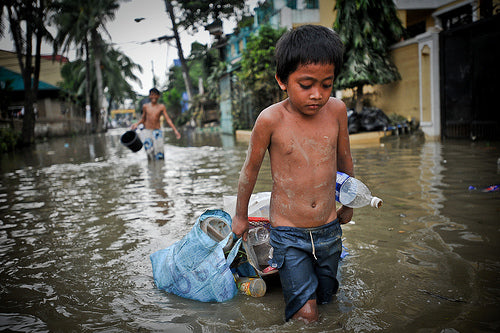
Safe Drinking Water Provisions in the Face of Disaster
By Dan DeBaunShare
When disaster strikes, the number one priority in ensuring the health and safety of survivors is the provision of safe drinking water. The stark reality of a large inhabited area being wiped out by a natural disaster is currently evident in the Philippines, where thousands of people have been left dead, and hundreds of thousands have been displaced without access to adequate shelter, food or drinking water in the wake of Typhoon Haiyan.
The horrific scenes that we are witnessing on our news channels are nothing short of apocalyptic. The situation in areas that received the brunt of the storm is pure hell. Help is slow in coming due to roads and airport infrastructure as well as other transport routes being inaccessible, making accessing the area a logistical nightmare. Desperate survivors are forced to loot shops for food, and drink whatever water they can find, regardless of the consequences. Considering the level of destruction, the fact that there is no power to boil water, and that water sources are most likely contaminated with all manner of toxins and pathogens, if victims are not provided with safe drinking water soon, this is very likely to lead to disease outbreaks, such as cholera and other life-threatening illnesses on a scale similar to that experienced in the aftermath of the 2010 Haiti earthquake. The situation on the ground is becoming more dangerous as there are fears that people may soon resort to violence in their desperation to get food and water.
Water Missions International, a nonprofit Christian organization that provides sustainable safe water and sanitation solutions for people in developing nations and disaster areas, has mobilized water treatment equipment and support staff as phase one of relief efforts to provide safe drinking water to victims of Super Typhoon Haiyan. Two disaster response water treatment systems sponsored by FedEx, 20 safe water treatment systems funded by The Pentair Foundation and 10 potable water chlorinators will be able to provide safe drinking water for the daily needs of 160,000 people in communities surrounding Cebu, Philippines, one of the most severely affected areas.“Safe drinking water is the number one need in the aftermath of a disaster. Deadly waterborne diseases spread rampantly in contaminated and untreated water and can be fatal in a matter of hours,” said George Greene IV, PE, president and chief operating officer at Water Missions International.Water Missions International has the capacity to provide even more assistance to victims, but limited funding is restricting their ability to provide ongoing relief. If you wish to assist the victims of Typhoon Haiyan by contributing to relief efforts, please visit Water International disaster response page, or the World Food Program, who are providing emergency food assistance.
“Our specialty is water and sanitation. In addition to our own efforts, we're coming alongside other major aid organizations as their implementing partner for the water component of aid relief. We are in dialogue with UNICEF about partnering with other organizations providing aid as we actively carry out our own response,” said Greene.Water Missions International is also providing back-up solar powered water treatment options that will not be affected in the event that fuel becomes unavailable.
“We are fortunate that our extensive experience working in Indonesia, another country of island chains, brings an understanding of the unique logistics requirements to move equipment and people across multiple islands,” said Greene. “It will be challenging. There could be isolated pockets of people all over the place, but Water Missions International has unique experience in these types of conditions and we are working to provide as much relief as possible.”Water Missions International is also monitoring the situation in other countries that may become affected by Typhoon Haiyan and will respond where necessary.
In the past, Water Missions International has provided relief to some of the largest natural disasters to strike the planet, including assisting victims of the tsunami that struck Southeast Asia in 2004, Hurricane Katrina in 2005, the Sichuan China earthquake in 2008, Haiti earthquake in 2010, and to victims of the recent floods that swept through southern Mexico in September this year.
We just donated to Water Missions to try to help and if you'd like to learn more and donate to their International disaster relief efforts yourself, please visit www.watermissions.org.
Natural disasters are becoming more frequent and more destructive, and can strike anywhere, anytime. It is advisable to prepare for any eventuality by putting together an emergency plan and preparing an emergency/disaster kit, making provisions for food and water requirements for you and your family. A drinking water filter that is capable of removing bacteria and viruses should form an essential part of that kit.
-
Regular price $234.00 USDRegular priceUnit price / per
-
Regular price $327.00 USDRegular priceUnit price / per
-
Regular price From $367.00 USDRegular priceUnit price / per
-
Regular price From $408.00 USDRegular priceUnit price / per
-
Regular price From $451.00 USDRegular priceUnit price / per
-
Regular price From $478.00 USDRegular priceUnit price / per
-
Regular price $332.50 USDRegular priceUnit price / per
$350.00 USDSale price $332.50 USDSale

Dan DeBaun
Dan DeBaun is the owner and operator of Big Berkey Water Filters. Prior to Berkey, Dan was an asset manager for a major telecommunications company. He graduated from Rutgers with an undergraduate degree in industrial engineering, followed by an MBA in finance from Rutgers as well. Dan enjoys biohacking, exercising, meditation, beach life, and spending time with family and friends.
~ The Owner of Big Berkey Water Filters
















